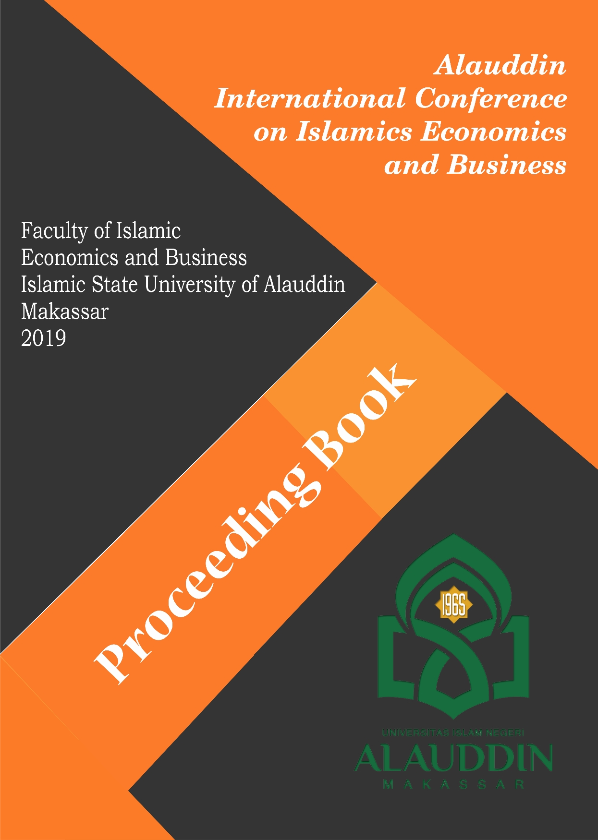ISLAMIC ENTREPRENEURSHIP BASED ON THE CONCEPT OF HONESTY
Abstract
Islamic entrepreneurship is an aspect of life that grouped into the problem of mu'amalah. This study aims to elaborated entrepreneurship in an Islamic perspective with the concept of honesty which has implications for strengthening Islamic values in entrepreneurial activities that can bring people closer to Allah swt. This study used library research with descriptive analysis method. All data collected by reviewing various books, literature, notes, including research that has not been or has been published to look for some references relating to Islamic entrepreneurship and the concept of honesty. It is known that the concept of entrepreneurship of the Prophet Muhammad was carried out by means of shiddiq, amanah, tabligh, fathonah according shariah principle as human representation to prospering the earth. The concept of entrepreneurship as solely because of Allah swt.Downloads
References
Abdul Mukmin, I. Emulating Prophet's Character in Establishing a Muslim Personality, Bandung: Rosdakarya, 2006.
Ahmad, Baso. Entrepreneur Organic: Success Secrets Of KH Fuad Afandi Together with Pesantren and Its Terakat, Bandung Nuansa Citra, 2009.
Alimuddin, dan Iwan Triyono, “Konsintments Selling Price Honesty: Profit Reaching the Benefits", Journal of Accounting Multiparadigm, Vol 2, No 1, 2011.
Ali, A, dan Zuhdi Muhdlor, Contemporary Arabic-Indonesian Dictionary, Yogyakarta: Multi works of Grafika Pondok Pesantren Krapyak, 8th Edition
Aprijon. “Entrepreneurship and Islamic Outlook”. Journal Tower, Vol.12 No.1, 2013.
Arikunto, Suasimi. Qualitative Research Methods, Jakarta : Bumi Aksara, 2006.
Aziz, Abdul. Business Ethics Islamic Perspective, Bandung: Alfabeta, 2013.
Bahri, "Islamic Entrepreneurship: Implementation of Entrepreneurial Concept and Transaction Sharia with Vertical Dimension (Hablumminallah) and Horizontal Dimension (Hablumminannas)". Macro, Sharia and Business Economics Journal, Vol. 1. No. 2. (November 2013)
Barnawi, M. Arifin. School Preneurship, Jakarta: Ar-Ruzz Media, 2012.
Basrowi. Entrepreneurship for Colleges. Bogor: Ghalia Indonesia, 2011.
Bastoni, Thus The Prophet of Business. Bogor: Pustaka Al-Bustan Badrudin. 2012.
Ministry of Religious Affairs, Qur'an and Translation. Bandung: CV Diponegoro, 2010
Fauzan, "Religiusity and Entrepreneurship Relations: An Empirical Study in an Islamic Perspective”, The Modernization Journal, Vol. 10, No. 2, 2013.
Fitriah, "Honesty in The Perspective of Islamic Psychology: The Study of Concepts and Empirical", Journal of Islamic Psychology, Vol. 4, No. 2. 2013.
Gusniarti, "Market Distortion in the Sharia Securities Transaction Process Secondary Market", Etikonomi Journal, Volume 14 (2), 2013
Hashim, Muhammad, "Islamic Perception of Business Ethics and the Impact of Secular Thoughts on Islamic Business Ethic", International Journal of Academic Research in Business and Social Sciences.Vol. 2, No. 3, (March 2013)
Hendayana, Yana. Sharia-Based Entrepreneurship, Bandung: Manggu Makmur Tanjung Lestari, 2017.
John M. Echols, English-Indonesian Dictionary, Jakarta: Gramedia, 2003.
Karim, Adiwarman. Islamic Microeconomics. Jakarta: Raja Grafindo Persada, 2007.
Majma ' Lughah Al-Arabiyah, al-Mu'jam al-Wajiz, Cairo: Maktabah al-Shuruq al- Dauliyah, 2004
Musfialdy, M. Soim, "The role of Islamic Values in Improving Entrepreneurship and Performance of Micro Enterprises (Study in Pekanbaru City Riau Province)”, Kutubkhanah: Journal of Social Studies of Religion, Vol. 19, No. 1 January-June 2013.
Nizar, Muhammad. "Principle of Honesty in Islamic Version of Ttrade", Journal Istiqro: Jurnal of Islamic Law, Economics and Business, Vol.4, No.1 (January 2018)
Norvadewi. A Business In The Perspective of Islam (Study Concepts, Principles and Normative Foundations), Economic and Business Journals, Vol. 1, No.1, (December 2013).
Rimiyati, Hasnah. "Influence on the Implementation of Islamic Entrepreneurship Values on the Success of Business (Study of SMES Muslim Entrepreneurs in Yogyakarta)", Business Management Journal, Vol. 7, No. 2, (September 2016)
Sugiyono, Qualitative Quantitative Research Method and R & D, Bandung: Alfabeta, 2012.
Suryana, Entrepreneurship (Practical Guide: Tips and Process to Succeed) Jakarta: Salemba Empat, 2009
Soemitra, Andri. Sharia-Based Entrepreneurship, Medan: CV. Manhaji, 2015.
Wijayanti, Ratna. "Building Islamic Entrepreneurship in Hadith perspective", Horizon Journal, Vol.13, No.1, 2018
Wignjosoebroto. Profession Ethics, Yogjakarta: Gramedia, 1999.

